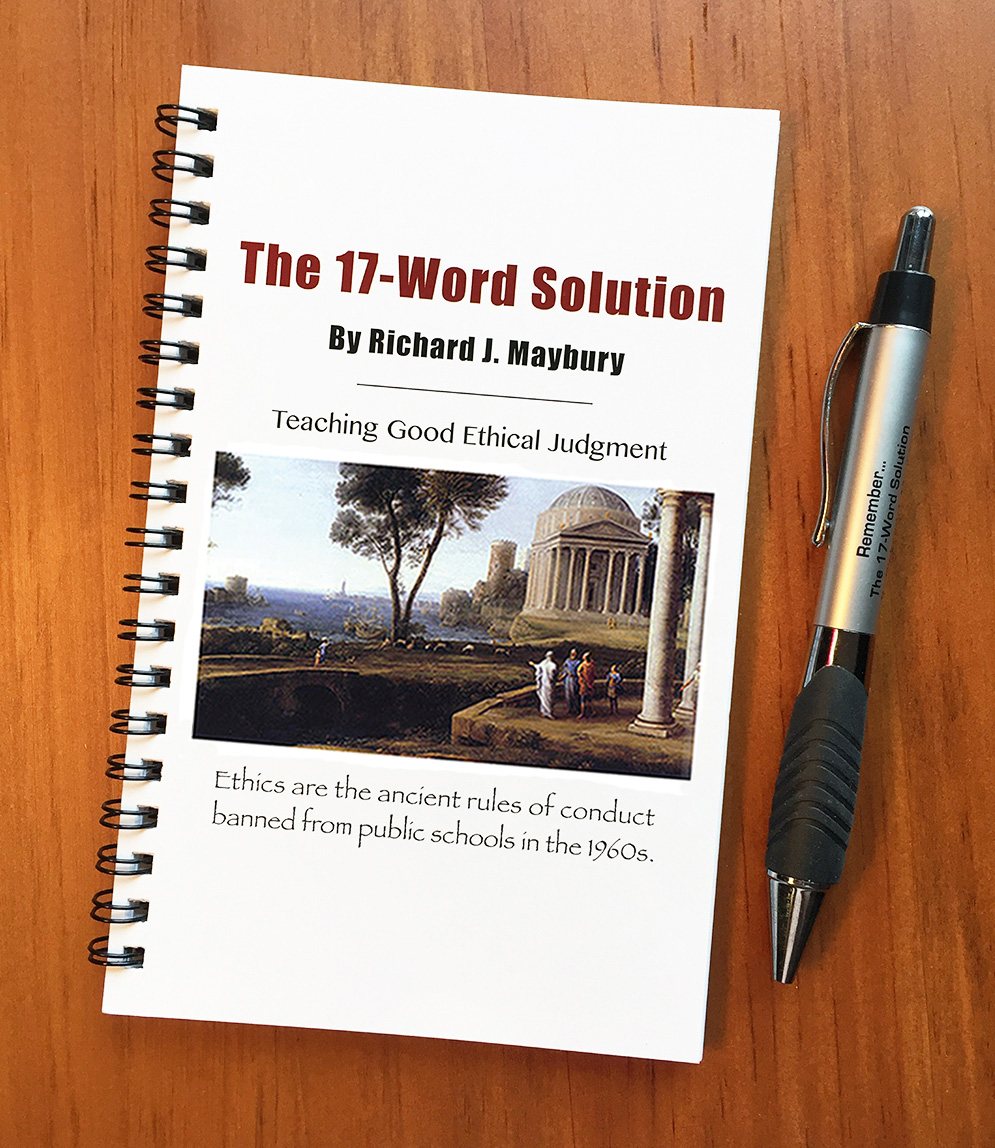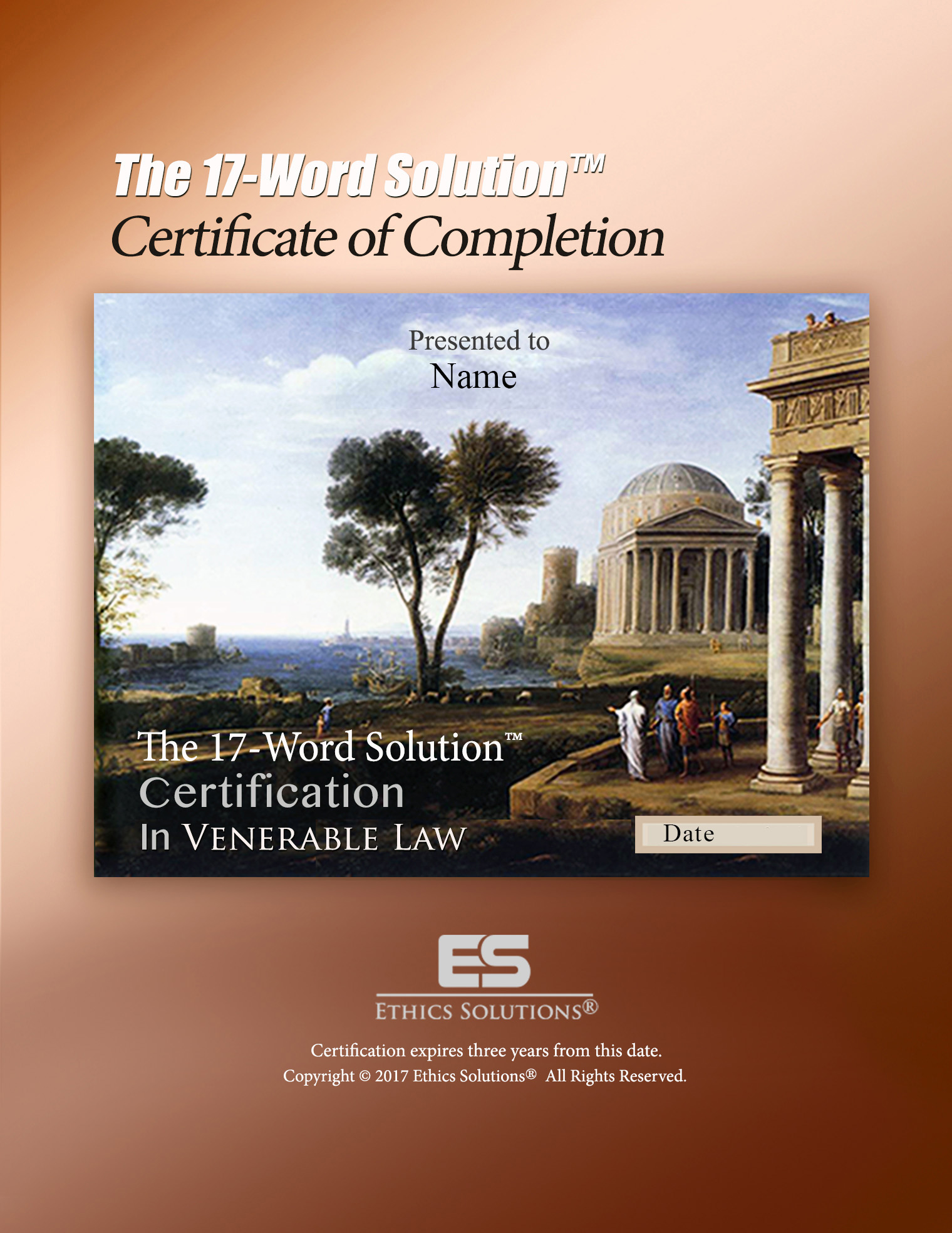

Restoring Ethics
Ethics are Essential for Civilization
There is a set of fundamental ethical principles agreed upon in all times and places. Examples are, don't steal, don't lie, and do what you say you will.
These rules are essential for civilization to function. This means, among other things, they are essential for businesses and all other forms of organization to be successful.
Ethics are essential for businesses and all other forms of organization to be successful.
Equally important is how to think about these rules—how to use them as tools to handle situations we run into each day at work, school and the rest of our lives.
At one time, these rules, and how to think about them and use them as tools, were taught in all schools, both public (meaning government-owned) and private.
But the rules had been extracted from religions, which was a problem.
In two decisions, in 1962 and 1963, the Supreme Court decided that in public schools, where most children are raised, it would henceforth be illegal for government to teach religion.
Certainly this was a good decision, because whose religion should the government teach? There are hundreds.
But forbidding the government to teach religion threw the baby out with the bathwater. As religion departed the classroom, ethics went with it.
Enter Values Clarification
By the 1970s educators recognized that something in the schools had gone terribly haywire. In 1972, they reacted by beginning a nationwide movement to teach Values Clarification.
The belief that right and wrong are just matters of opinion.
VC is intended to promote tolerance and respect for others. As Henry David Thoreau said, everyone is entitled to march to whatever drummer he hears.
But VC can lead to the impression that all truth is just a matter of opinion.
And, that has led to the belief that right and wrong are just matters of opinion.
Ethics Solutions does not believe Thoreau was mistaken, but he should have added, within limits.
What limits?
That's what Ethics Solutions is about. All cultures have always held that there are limits that apply to everyone [except for children below the age of reason], and we teach these limits.
Where are Ethics in schools today?
The majority of teachers are raised in public schools, so most of them in the classroom today received little instruction about right and wrong.
Lack of instruction in right and wrong meant big trouble was coming to America.
Parents were similarly left in the dark. So, very few adults now are equipped to instruct the children.
In short, when it comes to discovering ethics, the helpless are being led by the clueless.
In 1985, California Superintendent of Schools, Bill Honig, wrote a book called Last Chance For Our Children. In it, Honig warned that the lack of instruction in right and wrong meant big trouble was coming to America.
Another book of that time, Yes Virginia, There is Right and Wrong, by sociologist Kathleen M. Gow, sounded the same alarm.
Obviously, their warnings fell on deaf ears, and now we are paying the price. Dr. Leonard Sax, author of The Collapse of Parenting, says America today has entered "The age of awfulness." 2
In his book Lost in Transition, Notre Dame sociologist Christian Smith reports on the decline of ethics. What he and his research team learned from studying American youths ages 18 to 23, can be summarized by the comments of three young persons:
• "I guess what makes something right is how I feel about it. But different people feel different ways, so I couldn't speak on behalf of anyone else as to what's right and wrong."
• Right and wrong are "up to the individual. Who am I to say?"
• "I would do what I thought made me happy or how I felt. I have no other way of knowing what to do but how I internally feel." 5
Smith reports that "fully one in three of the emerging adults we interviewed said they simply did not know what makes anything morally right or wrong."
The 17-Word Solution™ restores Ethics
There is a body of ethics at least 25 centuries old that is extremely simple and easy to learn. Until the 20th century it was used as the bedrock of American tradition and law.
This body of ethics has been erased from popular culture now, but can still be found in the writings of the American Founders. Alexander Hamilton, for instance, wrote:
"Good and wise men, in all ages, have embraced …[the idea of] …an eternal and immutable law, which is indispensably obligatory upon all mankind, prior to any human institution whatever." 6
The teaching of this system of "eternal and immutable law" to American children was originally spread across at least six years of education. For instance, the 1920 edition of the McGuffey's Fifth Grade Reader contained the articles, "Do Not Meddle," "Control Your Temper," "Sowing and Reaping," and "The Character of a Happy Life."

Available only from Ethics Solutions®, this concise, revealing handbook helps you explore the fascinating but forgotten world of ethics. Contents
But McGuffey's books also spoke of religion, so today they are gone from public schools. (They are still used in some private schools and homeschooling.)
We at Ethics Solutions have condensed the six years of ethics instruction into a single small, easy-reading booklet called The 17-Word Solution.™ This handbook is the first step toward solving your ethics problems; every parent should read it, and require that their children read it, too. This takes only about two hours for someone who reads at an eighth grade level.
Yes, six years of enlightenment in just two hours.
And please think about this: if you do not teach ethics to your children, who will?
After a child has read the handbook, he or she takes a 40-question multiple choice assessment electronically.
The Ethics Solutions® Assessment helps you evaluate how well you and your children absorbed The 17-Word Solution.™ It usually takes less than 30 minutes and is given online.

Certificate 8x10
It is instantly scored, and the results are reported to the parent and child.
If the child has demonstrated proficiency, a Certificate of Completion is immediately issued to him or her.
This handsome, impressive, full-color certificate gives the parent and child a sense of pride and confidence so that, in the face of troublesome peer pressure, the child will stand his ground and do the right thing.
If the child did not achieve proficiency, he or she can review the handbook and go through the assessment again.
It may only take one unethical act to stain a young person's character in the sensitive years of his or her life.
But a child who has a reputation for always behaving ethically is golden.
The Ethics Course creates depth
The 17-Word course of instruction yields a depth of understanding about ethics that you will not find anywhere else.
People who have this depth are noticed and sought after, because these days, they are unusual, remarkable, and impressive.
In other words, people with a deep understanding of ethics have a competitive advantage in every part of life, from getting a good job, to running a successful business, to finding and keeping a partner.
When you finish the course, you will be amazed. You will want everyone who touches your life to take the course too, because this will make your personal life more easy and enjoyable, we promise.

or call our friendly customer service representative at 877-226-1263 or 602-445-2737.
1 "IF IT FEELS RIGHT…," NY Times website, September 12, 2011.
2 "Parenting in the Age of Awfulness," WALL STREET JOURNAL, December 18, 2015, p. A15.
3 WALL STREET JOURNAL, November 23, 2015, Small business Section, p 1.
4 From the November 23, 2015 WALL STREET JOURNAL article.
5 "If It Feels Right…," by David Brooks, NEW YORK TIMES website, September 11, 2012.
6 THE AMERICAN TRADITION, by Clarence Carson, Foundation for Economic Education, 1979, p.42.